Anaheim teams with county to take down taco stand pop-ups
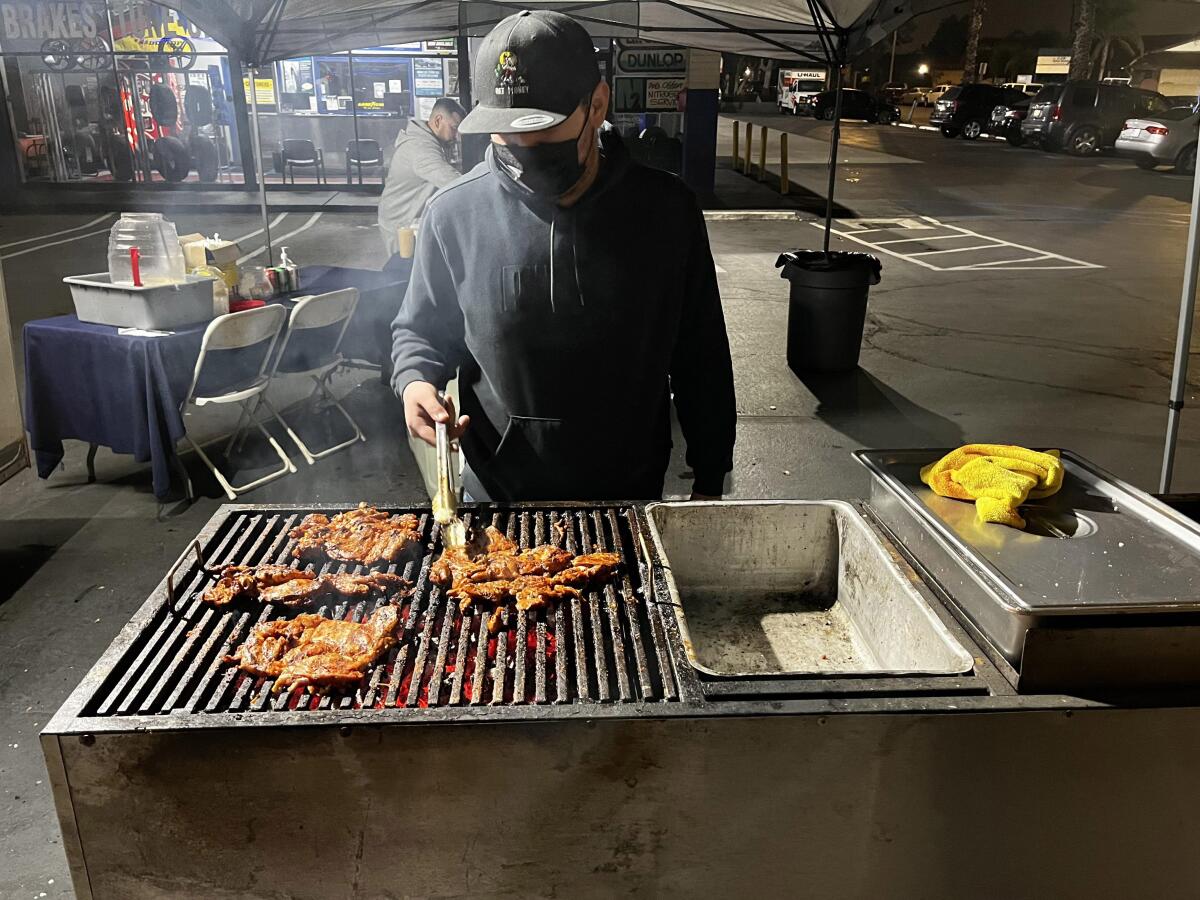
- Share via
A sidewalk taco stand in Anaheim found itself caught in the crossfire of a carne asada crackdown one recent night when code enforcement pulled up.
It wasn’t completely unexpected. Backed by county health officials, they made good on a past warning: if the taqueros popped up again to sell food without a permit, equipment would be impounded.
“We’re not doing anything wrong,” Roberto, the pop-up’s owner who feared using his real name, recalled pleading.
He had good reason to believe so.
Ever since this summer, pop-up taqueros have set up on sidewalks across Anaheim, their spotlights and grills billowing fragrant smoke drawing dozens of eaters every night and thousands of hungry followers on social media. But this budding scene has also led to a steady stream of complaints.
“Please don’t let Anaheim become East Los Angeles or Compton with vendors on every street corner,” read a recent complaint obtained by TimesOC. “This city is known to be a safe and clean city and we hope it stays that way.”
As a result, city officials began to meet with the Orange County Health Care Agency in September. The county holds greater authority over unpermitted food vending. Anaheim code enforcement keeps a more watchful eye on the city. The two decided to team up.
A pilot program, the first of its kind in the county, launched in October. Unpermitted stands are now subject to confiscations with greater efficiency.
The night Roberto learned that firsthand, code enforcement took pictures of his taqueros, cooking equipment and the license plate of his van. Health officers then confiscated almost all of his property.
“They threw away all of the food too,” he added.
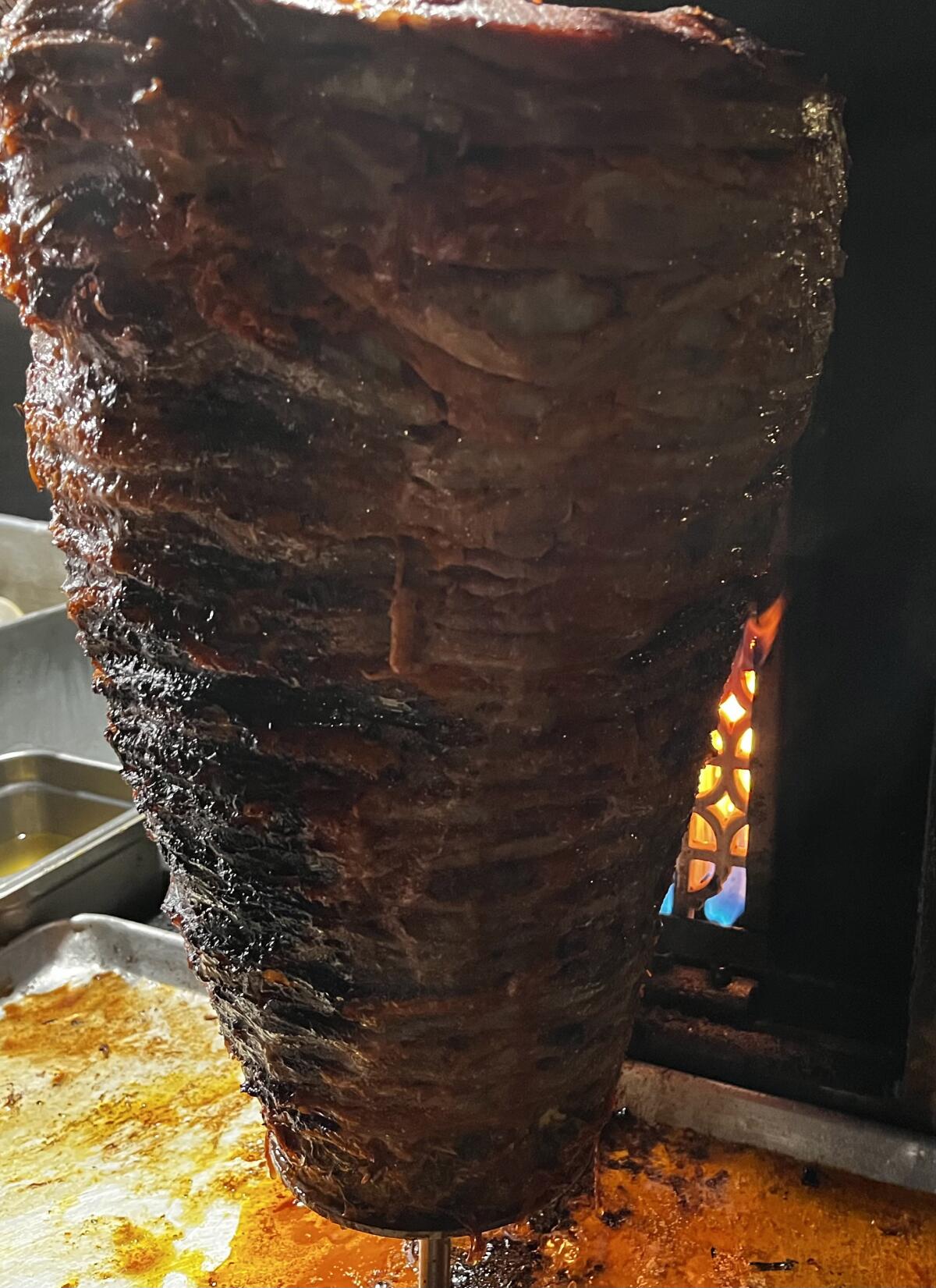
But not before issuing another warning. If the taco stand returned, health officers would confiscate equipment again.
As part of Anaheim’s current pilot program, code enforcement teams with 17 assigned county environmental health specialists two days a week, every week. There are also evening patrols at least two days a month, especially on weekends.
Since the program began, the city has received 221 complaints about sidewalk food vending. Code enforcement has handed out 31 violation notices during that time. The county has carried out 32 equipment confiscation actions.
The program will continue through the end of the year before being reevaluated.
“Unpermitted food operations ... operate outside of the food safety laws and regulations,” said Darwin Cheng, assistant director of the Orange County Health Care Agency’s environmental health division. “This poses a public health concern and food safety risk to the community.”
“Our partnership with the county reflects that shared concern that we both have,” said Mike Lyster, Anaheim spokesman. “What we see in some cases is grease dumped into a storm drain and leftover food discarded in planters. We’ve had complaints about somebody tapping electricity at a nearby building. I think we can all agree that’s not the right way to go about this.”
It’s the latest clash in a decades-long fight over street vending in Anaheim, which has seen the city pass multiple ordinances banning street vendors — and street vendors suing for the right to sell.
“You see taqueros now in most of the cities,” Roberto said. “We found this little corner right here in Anaheim and said let’s give it a try.”
Only, the city’s sidewalks have been mostly clear of street vendors for a reason.
In 1986, the city banned vendors from operating in apartment areas. A vending law passed that same year lifted the ban in favor of heavy regulations, but still prohibited paleteros from selling Mexican popsicles from pushcarts.
A task force formed to evaluate the ordinance three years later and split over key provisions like only allowing vendors to remain in a location for 30 minutes and keeping a complete ban on amplified sound. Vendors wanted an hour and criticized Anaheim’s annual business licensing fees and insurance requirements as too expensive.
In the years that followed, Anaheim limited vendor trucks to 15 minutes of stationary time. Back when it had the authority, code enforcement wrote up hundreds of violation citations, including notices for vendors to appear in court for not having a current health permit.
In 2018, Gov. Jerry Brown signed the Safe Sidewalk Vending Act, which decriminalized street vending under certain conditions. Anaheim responded by adopting an ordinance that continued to ban street vending from the Anaheim Resort as well as the Platinum Triangle area during special event hours.
It shored up the city’s dwindling authority to determine where street vendors are allowed to operate out of public health, safety and welfare concerns.
That’s the balancing act where the pilot program finds itself.
Cheng noted that impounded equipment can be retrieved within 30 days after an office hearing is scheduled.
“When equipment is impounded, education is provided to the unlawful vendors on ways to operate legally,” he added.
Anaheim doesn’t want to be solely punitive in its approach, either.
A bilingual code enforcement fact sheet spells out what sidewalk food vendors need to have in order to be allowed to operate in legal areas: a vendor permit or business license from the city, a health permit from the county health department, a valid California Department of Tax and Fee Administration seller’s permit and foodstuffs from an approved source or facility permitted by the county health department.
But Roberto said the path to permitted sidewalk food vending isn’t quite so easy.
“They won’t give you a permit for these type of carts,” he said. “They charge you for the process of getting a permit. Once inspection comes in and looks at the stand, they don’t approve it. So, you don’t end up getting a permit and you lose your money.”
Lyster reported that the city has six permitted sidewalk flower vendors but none where it concerns sidewalk food vending, which includes pushcarts, stands and wagons.
“When it’s done right, we see it as an asset to the city,” he added. “I just don’t see how we would be in a position to decline anybody if they met all permitting requirements.”
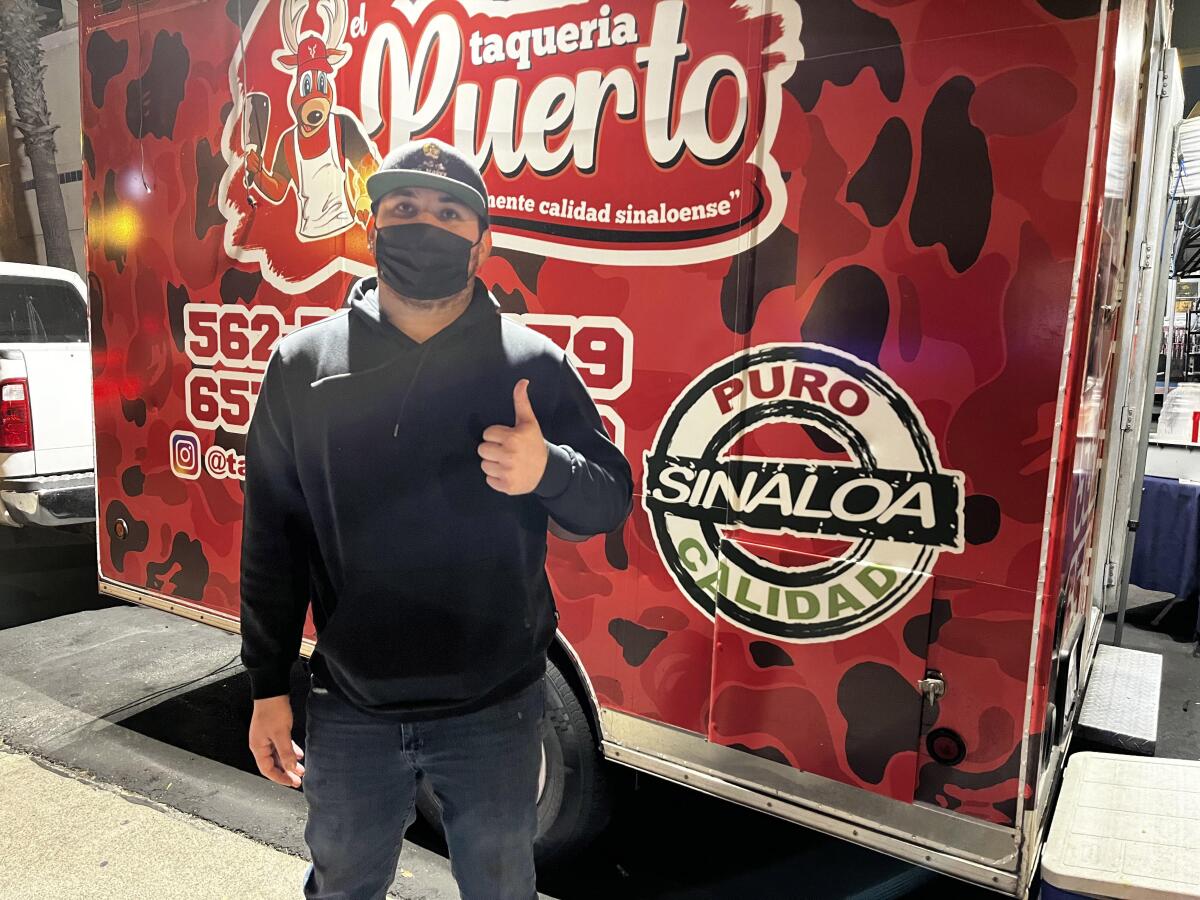
There’s also the path of becoming a permitted food truck owner, which many pop-ups aspire to.
There was a stark difference between the two on a recent Friday night. Chatter on the street vending scene surrounded a taco stand having been flagged by the pilot program and told to disband without having their property confiscated. Less than half a mile away, Taquería El Puerto operated out of a trailer parked outside a Goodyear Tire shop free from worry with a county health permit posted from its window.
“I know it’s hard for some people to get situated with a lunch truck like this because it costs money,” said Mitchell Garcia, Taquería El Puerto’s owner. “I have nothing against pop-up stands because I know everybody has to work and jobs are hard right now.”
Garcia owned Cali 4 Tacos, a Bellflower brick-and-mortar, before the pandemic took it out of business. Taquería El Puerto, his three-month-old food trailer, serves up Sinaloa-style tacos with a taquero grilling meat over smoldering charcoal. The carne asada comes chunkier, fatty but not too greasy with every bite being smoky and savory.
“Police officers come and eat here, actually,” Garcia said. “They say our vampiro tacos are really good.”
The Costa Mesa resident hopes that the uniqueness of his Sinaloa-style offerings in Orange County will see Taquería El Puerto graduate from trailer to food truck — or even brick-and-mortar — soon enough.
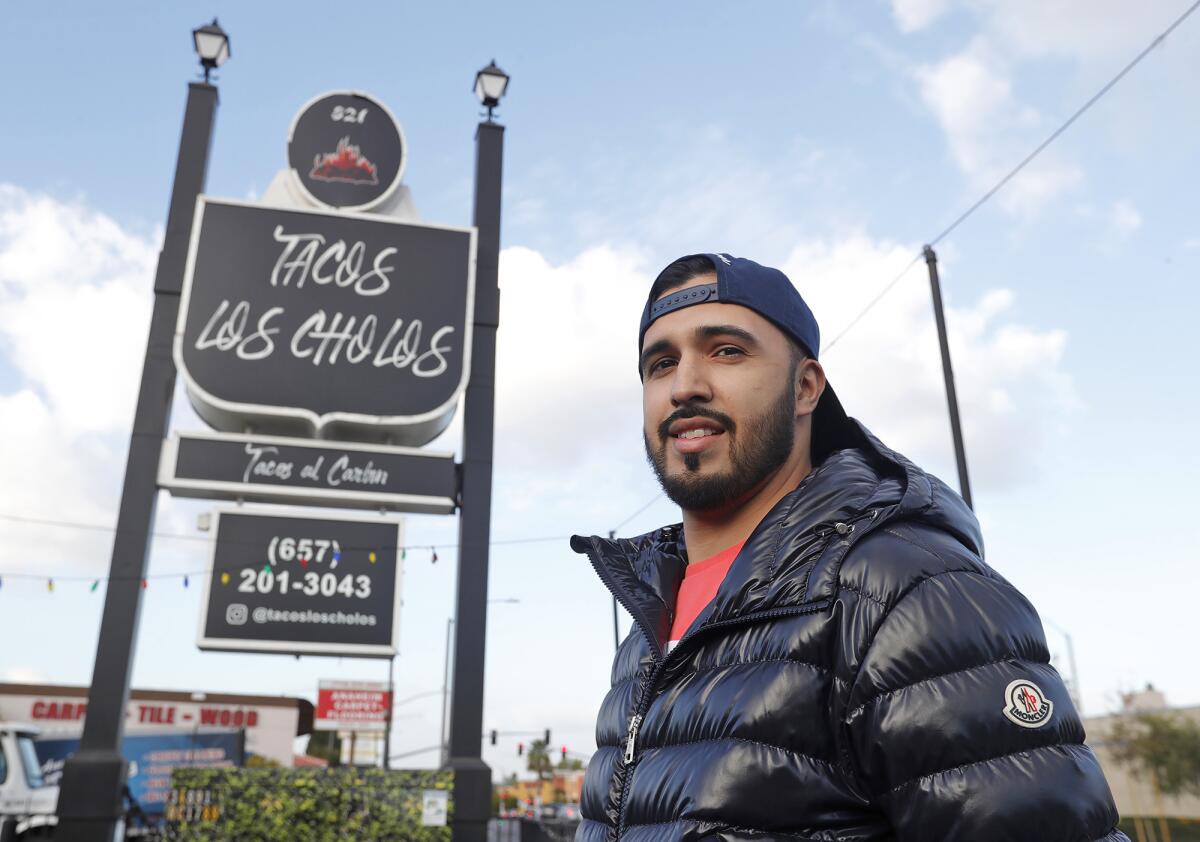
Tacos Los Cholos made the leap from pop-up to restaurant against the Anaheim odds.
Josue Maldonado and Michael Alvarado, two Anaheim friends, started the business in 2019, back when taco stands were a novelty in the city. It quickly became a social media sensation. The newfound attention also extended to code enforcement, which tailed Tacos Los Cholos for months.
“Eventually, they caught up to us,” Maldonado said. “They said, ‘shut it down or we won’t give you guys a business permit when you do turn into a business.’”
Fortunately, a family friend who owned a restaurant in the city allowed Tacos Los Cholos to grill on-site. They saved money, bought half of the struggling restaurant and eventually took over the location last year.
Now, Tacos Los Cholos has opened a second restaurant in Fullerton.
A code enforcement file thicker than a stack of tortillas at City Hall proved the pop-up could’ve just as easily been folded down.
“Before we would set up, code enforcement would show up at our house waiting to see if we were going to be selling that day,” Alvarado recalled. “It’s just really tough out here. They’re looking for any small thing to get you on.”
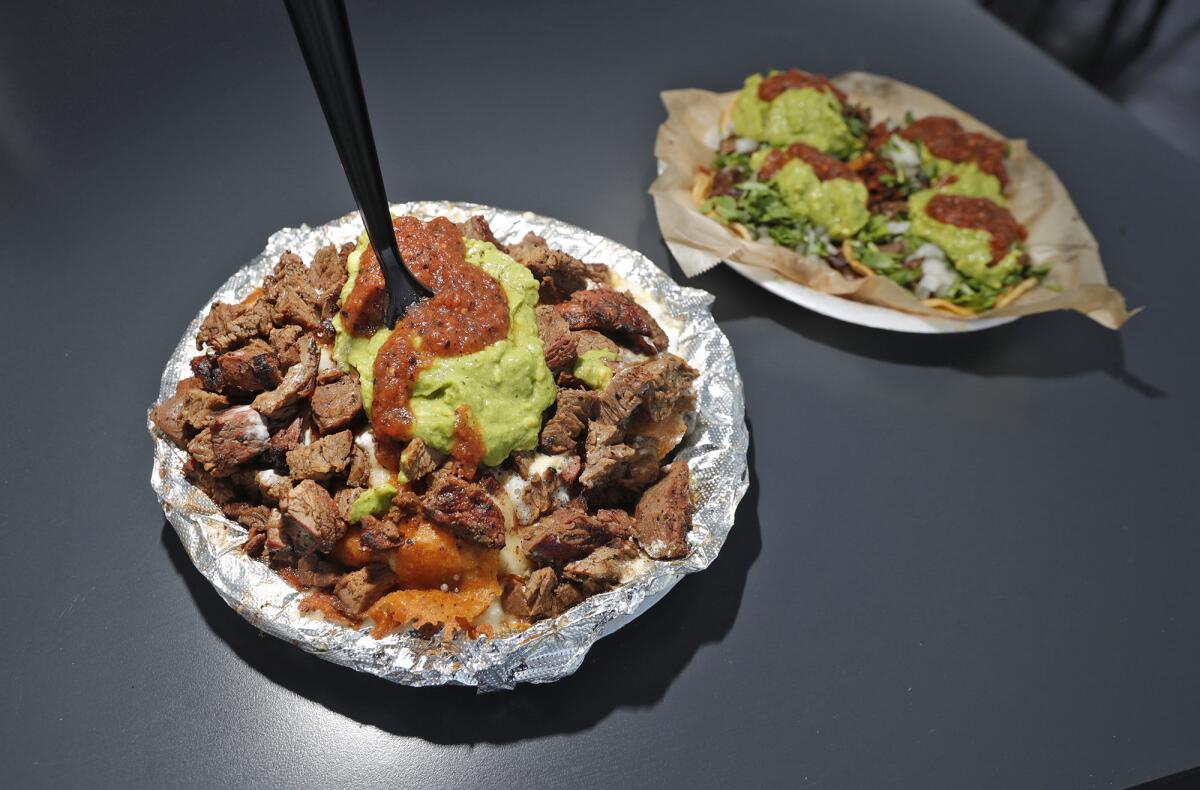
With a spacious patio, tiered taco menu and a liquor license, Tacos Los Cholos doesn’t see current pop-ups, even those that set up along the same stretch of State College Boulevard it occupies, as unfair competition.
But other businesses elsewhere in the city do.
“We appreciate anybody out there trying to make a living and being entrepreneurial,” Lyster said. “At the same time, we have many brick-and-mortar restaurants. They’ve got extra costs that a street vendor won’t have.”
For out-of-town taqueros like Roberto, his home city of East L.A. is just too competitive for sidewalk food vendors, but that doesn’t mean he undercuts brick-and-mortar taquerías in Anaheim.
“We price match to whatever tacos are going for,” Roberto said. “We have to make our tacos not too expensive, not too cheap. Prices went up on meat. We have to compare and blend in.”
Despite enforcement actions, Roberto set up in the same location on a recent weekend night; the pop-up cooked and sold $2 tacos for hours without incident. The wintery weather has slowed business down, but as a caterer who endured the pandemic by becoming a warehouse worker, it’s still a hustle worth his time, risks and all.
Roberto knows it’s a longshot, but he still hopes to be able to save up to run a properly permitted food truck, an expense he tallies at more than $100,000. For now, every night his crew of taqueros gets to pack up their equipment without a visit from the pilot program is one step closer.
“The only thing that we want to do is work hard,” Roberto said. “If we’re not allowed to work and save up to be able to buy what we need so that they no longer harass us — by taking our equipment and throwing everything away — we end up starting again from the bottom.”
All the latest on Orange County from Orange County.
Get our free TimesOC newsletter.
You may occasionally receive promotional content from the Daily Pilot.






